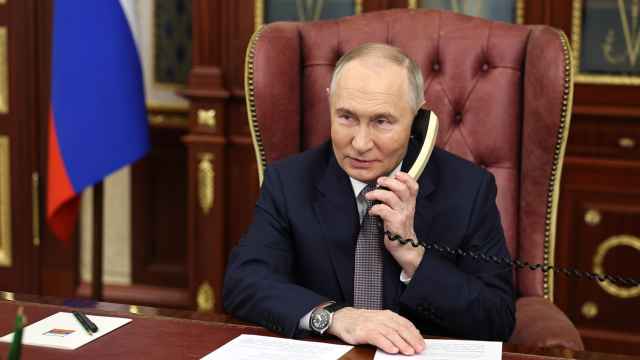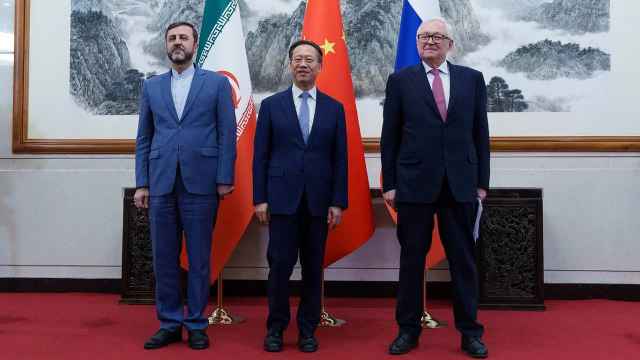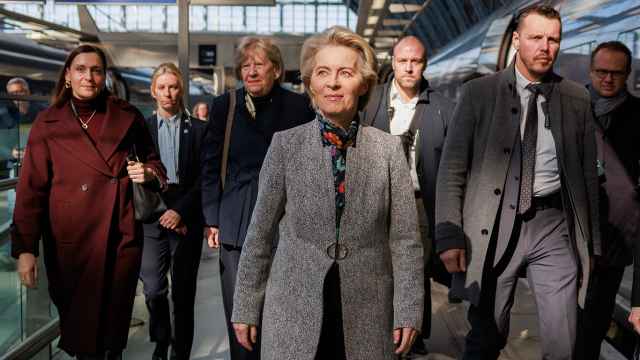Ukraine's foreign minister insisted Wednesday that the conviction of former Prime Minister Yulia Tymoshenko would have no affect on relations with the West, but analysts said the court's ruling can only result in Ukraine being firmly pushed back into Russia's arms.
Both the European Union and the United States have condemned the verdict as overtly political, and many observers believe efforts to forge a cooperation agreement between Ukraine and the EU have been badly shaken.
"An enormous amount of damage has been done," said James Sherr, senior fellow of the Russia and Eurasia program at Chatham House in London. "[President Viktor] Yanukovych has isolated himself from the West with this verdict."
But Ukrainian Foreign Minister Kostyantyn Gryshchenko said he expected an agreement to be reached with the EU this year while strongly denying the verdict was politically motivated.
"I think we will have progress on the association agreement in the weeks to come, and it is my belief that before the end of the year we will be able to initial it," he said at a news conference in Estonia's capital, Tallinn.
Sherr thought it unlikely that such a deal could ever be reached and that the more realistic outcome would be Russia having a much stronger hand in a now-weakened Ukraine.
"The West's response is unavoidable, almost automatic," he said in a phone interview. "While the EU cannot be expected to entirely walk away from this — a lot of progress has been made — the greater likelihood is that Russia will come away from this in a far stronger position."
If the association agreement falls apart, he said it can only benefit Russia's efforts at widening its custom's union with Belarus and Kazakhstan.
"Bringing them into the custom's union and the wider 'Eurasian Union' — if that ever develops — gives it credibility," he said.
But Vladimir Milov, a former deputy energy minister and opposition politician, said he did not expect to see Russia try to immediately exert its influence.
"I believe that the Russian position will remain a pragmatic one, since the country's leadership is not interested in worsening relations," he said. "The Kremlin considers everything happening in Ukraine an internal matter, and it would be strange for them to criticize the same thing they are trying to implement in Russia."
Yanukovych has long been viewed as more pro-Russian. He was Russia's preferred choice in the 2004 presidential election, which he lost to pro-Western Viktor Yushchenko in a bitterly contested race that led to the Orange Revolution. Once he defeated Tymoshenko in 2009, he signed an agreement to continue hosting Russia's naval fleet until 2042, but he has so far declined to join the customs union.
Tymoshenko was sentenced Tuesday to seven years in prison for exceeding her authority in brokering a gas contract with Russia in 2009, ending a bitter dispute that left areas of Europe freezing in the dead of winter. Yanukovych has sought to renegotiate the deal, which left Ukraine's Naftogaz paying a steep price to Gazprom for Russian gas.
Both the EU and the White House immediately criticized the sentence and questioned whether Ukraine was slipping closer to becoming an authoritarian state.
"The charges against Mrs. Tymoshenko and the conduct of her trial, as well as the prosecution of other opposition leaders and members of the preceding government, have raised serious concerns about the government of Ukraine's commitment to democracy and rule of law," said White House spokesman Jay Carney in a statement.
Tymoshenko's lawyer, Yury Sukhov, said Wednesday that she planned to file an appeal in Ukraine in a few days. Her legal team has also suggested that she would file an appeal in an international court.
"We believe that this verdict is absurd," Sukhov told reporters in Kiev. "In fact, there is no indication that any laws have even been broken."
Yanukovych has left open the possibility that Tymoshenko's verdict will be overturned on appeal or that the law under which she was convicted will be rescinded.
Vadim Karasyov, director of the Institute of Global Strategy in Kiev and a former adviser to Yushchenko, said the trial may have been part of a complicated strategy on Yanukovych's part to undermine his longtime political foe while allowing him to cancel the existing gas contract.
"She will still have a spot on her reputation," he said. "This process was a political one."
Prime Minister Vladimir Putin said Tuesday that he was surprised by the harsh sentence and warned that efforts to tear up the 2009 gas deal could hurt ties between the two countries.
Konstantin Zatulin, a United Russia deputy on the State Duma's CIS Committee, said Yanukovych had been greatly weakened by the Tymoshenko affair, but he did not expect the fallout to manifest itself immediately.
"If something will happen, it will be done behind closed doors," he said.
Ukrainian Prime Minister Mykola Azarov and Gazprom chief Alexei Miller both suggested Wednesday that a compromise on the gas deal may be reached before the end of the month.
"I am convinced that in the coming weeks we will strike a compromise with Russia on the price of gas and will receive a just and acceptable price," Azarov said at a government meeting in Kiev.
"Talks with our Ukrainian colleagues are very active and positive," Miller told RIA-Novosti. "Many complicated questions remain, but a final agreement can absolutely be reached in the coming days."
A Message from The Moscow Times:
Dear readers,
We are facing unprecedented challenges. Russia's Prosecutor General's Office has designated The Moscow Times as an "undesirable" organization, criminalizing our work and putting our staff at risk of prosecution. This follows our earlier unjust labeling as a "foreign agent."
These actions are direct attempts to silence independent journalism in Russia. The authorities claim our work "discredits the decisions of the Russian leadership." We see things differently: we strive to provide accurate, unbiased reporting on Russia.
We, the journalists of The Moscow Times, refuse to be silenced. But to continue our work, we need your help.
Your support, no matter how small, makes a world of difference. If you can, please support us monthly starting from just $2. It's quick to set up, and every contribution makes a significant impact.
By supporting The Moscow Times, you're defending open, independent journalism in the face of repression. Thank you for standing with us.
Remind me later.





